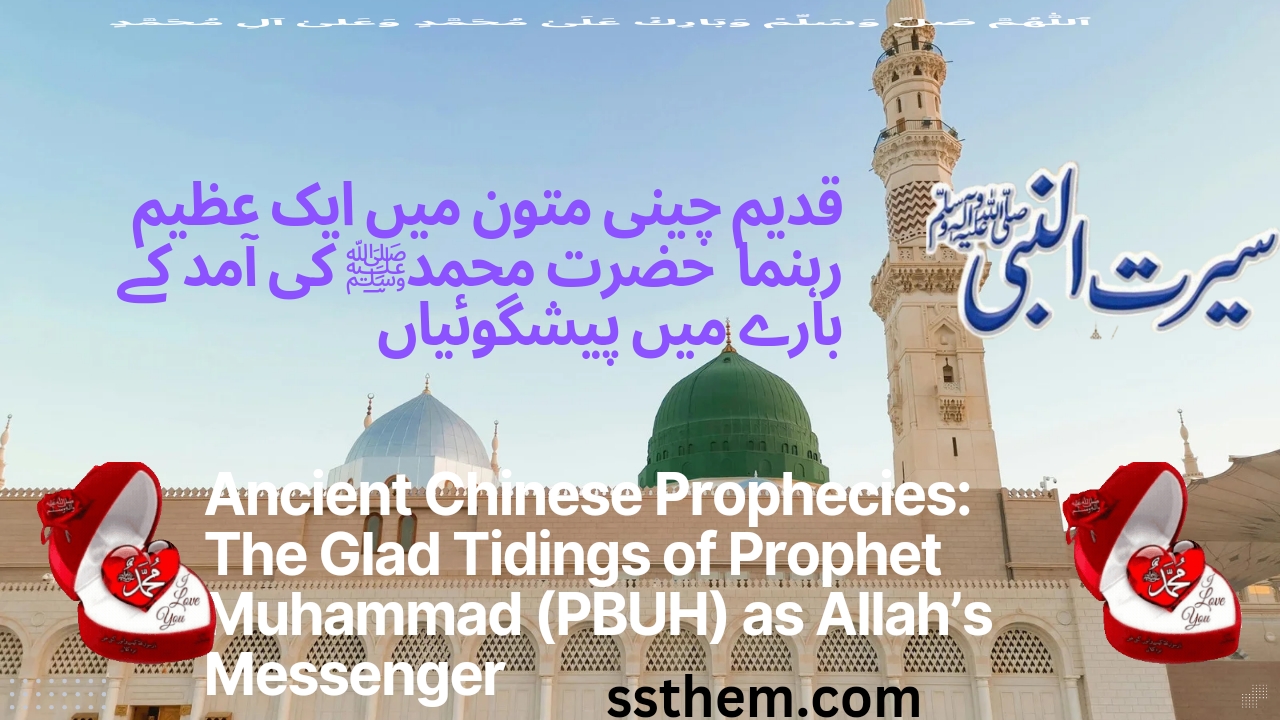قدیم چینی متون میں ایک عظیم رہنما کی آمد کے بارے میں پیشگوئیاں.
Throughout history, various civilizations have left behind texts that foretold the arrival of significant leaders or messengers. Some scholars have found intriguing references in ancient Chinese texts that they interpret as predictions regarding the coming of Prophet Muhammad (PBUH). These texts, while cryptic, are said to offer insights into the spread of a monotheistic message, divine guidance, and ultimately success for humanity through the teachings of ALLAH.
**تاریخ کے دوران، مختلف تہذیبوں نے ایسے متون چھوڑے ہیں جو اہم رہنماؤں یا پیغامبروں کی آمد کی پیشگوئیاں کرتے ہیں۔ کچھ علماء کو قدیم چینی متون میں ایسی دلچسپ پیشگوئیاں ملی ہیں جنہیں وہ حضرت *محمد ﷺ* کی آمد کے بارے میں سمجھتے ہیں۔ یہ متون، اگرچہ پیچیدہ ہیں، لیکن کہا جاتا ہے کہ وہ ایک توحیدی پیغام، اللہ پاک کی ہدایت، اور انسانیت کے لیے کامیابی کے بارے میں وضاحت دیتے ہیں۔**
1. Prophecy in the “Huangdi Neijing” (黄帝内经)
“Huangdi Neijing” (The Yellow Emperor’s Classic of Medicine), compiled around 206 BCE, is considered one of the fundamental texts of Chinese medicine and philosophy. Some scholars point to certain lines in this text that speak of a great and wise figure coming from the West, bringing profound changes and enlightenment to the people.
- Original Language (Chinese):
“西方将出现一位伟大的人物,他将带来光明与智慧。” - Translation:
“A great figure will emerge from the West, bringing light and wisdom.”
Explanation: Many Islamic scholars see this as a reference to Muhammad (PBUH), who is believed to have brought the divine light of ALLAH‘s message from the West of China, spreading success and guidance. The light and wisdom can be interpreted as the Qur’an, the ultimate source of knowledge for humanity.
تشریح: بہت سے اسلامی علماء اس پیشگوئی کو حضرت محمد ﷺ کے بارے میں سمجھتے ہیں، جنہوں نے اللہ پاک کے پیغام کی روشنی مغرب سے لاکر پھیلائی اور کامیابی اور ہدایت کا ذریعہ بنے۔ روشنی اور حکمت کو قرآن کی صورت میں انسانیت کے لیے علم کا آخری ذریعہ قرار دیا جا سکتا ہے۔
2. The “Tui Bei Tu” (推背图) Prophecies
The “Tui Bei Tu”, attributed to Li Chunfeng and Yuan Tiangang during the Tang Dynasty (618–907 CE), is a well-known Chinese prophetic text. One specific prophecy in this book describes a great teacher who would come from the West and unite the world under a single creed, guiding people to success.
- Original Language (Chinese):
“圣人西来,传教化万邦。” - Translation:
“The sage comes from the West, teaching and guiding all nations.”
Explanation: This prophecy is often interpreted by some scholars as a reference to Muhammad (PBUH), who is regarded as a successful messenger of ALLAH sent to guide all of humanity. The description of the sage coming from the West and spreading wisdom aligns with the spread of Islam from Arabia to other regions.
تشریح: یہ پیشگوئی حضرت محمد ﷺ کی آمد کا حوالہ سمجھی جاتی ہے، جنہیں اللہ پاک کا کامیاب پیغامبر سمجھا جاتا ہے جو پوری انسانیت کی رہنمائی کے لیے بھیجے گئے۔ مغرب سے ایک عظیم رہنما کے آنے اور حکمت پھیلانے کا ذکر اسلام کے عرب سے دیگر علاقوں تک پھیلاؤ سے مطابقت رکھتا ہے۔
3. Prophecy in the “Jing Shan Lu” (京山录)
The “Jing Shan Lu”, written during the Song Dynasty (960–1279 CE), contains cryptic statements about the arrival of a new and righteous leader who will bring success to his followers and teach them the way to eternal peace. The text mentions a leader from the West who will introduce a divine law that promotes harmony.
- Original Language (Chinese):
“从西方来的圣人带来一种新的律法,他的追随者将在世界上获得伟大的成功。” - Translation:
“A sage from the West will bring a new law, and his followers will achieve great success in the world.”
Explanation: This can be linked to the coming of Muhammad (PBUH), who brought the divine law of ALLAH through Islam. The success mentioned here is often interpreted as the spiritual and worldly success achieved by the early Muslim community under the guidance of the Prophet Muhammad (PBUH).
تشریح: اس پیشگوئی کو حضرت محمد ﷺ کی آمد سے جوڑا جا سکتا ہے، جنہوں نے اللہ پاک کے حکم سے اسلام کا قانون لایا۔ یہاں مذکورہ کامیابی کو ابتدائی اسلامی معاشرے کی روحانی اور دنیوی کامیابی کے طور پر سمجھا جاتا ہے جو حضرت محمد ﷺ کی رہنمائی میں حاصل ہوئی۔
4. “Bamboo Annals” (竹书纪年)
The “Bamboo Annals”, an ancient historical record of China dating back to the Warring States period (475–221 BCE), contains references to future events and leaders. Some scholars have pointed out a prophecy that speaks of a messenger from the West who will lead people to ultimate success and peace.
- Original Language (Chinese):
“一位来自西方的使者将引领人民走向最后的胜利与和平。” - Translation:
“A messenger from the West will lead the people to final victory and peace.”
Explanation: This prophecy can be viewed as alluding to Muhammad (PBUH), who led the Muslim Ummah (community) to success in both worldly matters and spiritual salvation through the teachings of ALLAH. The concept of final victory and peace resonates with the message of Islam, which promotes harmony, justice, and ultimate peace through submission to ALLAH.
تشریح: اس پیشگوئی کو حضرت محمد ﷺ کی طرف اشارہ سمجھا جا سکتا ہے، جنہوں نے اسلامی اُمت کو دنیاوی اور روحانی کامیابی کی طرف رہنمائی دی۔ آخری فتح اور امن کا تصور اسلام کے پیغام سے مطابقت رکھتا ہے، جو اللہ پاک کی طرف رجوع کرنے سے حاصل ہوتا ہے۔
5. “I Ching” (易经) – The Book of Changes
The “I Ching”, also known as the Book of Changes, is one of the oldest Chinese classics, traditionally believed to date back to the 3rd millennium BCE. It contains a system of divination and offers philosophical insights into change and balance in the world. Some scholars have suggested that certain passages allude to a great transformation that will be brought by a man from the West, spreading the wisdom of the divine.
- Original Language (Chinese):
“西方之君临,将教导人们追求真理与成功。” - Translation:
“A ruler from the West shall come, teaching people to pursue truth and success.”
Explanation: This passage has been interpreted as referring to the arrival of Muhammad (PBUH), who came with the divine message of ALLAH and led the people toward success through truth, faith, and righteousness. The term “ruler” can be seen as a metaphor for a spiritual leader, one who brings balance and enlightenment to the people.
تشریح: اس عبارت کی تشریح حضرت محمد ﷺ کی آمد کے طور پر کی جاتی ہے، جو اللہ پاک کے الہی پیغام کے ساتھ آئے اور لوگوں کو سچائی، ایمان، اور راستبازی کے ذریعے کامیابی کی طرف لے گئے۔ “رہنما” کو ایک روحانی رہنما کے طور پر بھی دیکھا جا سکتا ہے جو لوگوں کے لیے توازن اور روشنی لاتا ہے۔
6. “The Tai Ping Jing” (太平經)
The “Tai Ping Jing” (The Scripture of Great Peace), written during the Han Dynasty (206 BCE – 220 CE), discusses the coming of a sage who would bring peace, justice, and success to all people. This text highlights the arrival of a new era marked by unity under divine guidance, where a righteous leader would establish a just order.
- Original Language (Chinese):
“圣人将来自西方,他将带来新的法则,世人将在他的教导 سے得以成功与和平。” - Translation:
“A sage will come from the West, bringing a new law. The people will achieve success and peace through his teachings.”
Explanation: Scholars who study these texts often see this prophecy as pointing to the arrival of Muhammad (PBUH), who brought the divine law of Islam. The reference to a “new law” can be interpreted as the introduction of Shariah, the legal and ethical system of Islam. The concepts of success and peace resonate with the Islamic promise of prosperity in both this life and the hereafter for those who follow the teachings of ALLAH and His Messenger, Muhammad (PBUH).
تشریح: ان متون کا مطالعہ کرنے والے علماء اکثر اس پیشگوئی کو حضرت محمد ﷺ کی آمد کی طرف اشارہ سمجھتے ہیں، جو اسلام کے الہی قانون کے ساتھ آئے۔ “نئے قانون” کا حوالہ شریعت کے تعارف کے طور پر لیا جا سکتا ہے، جو اسلامی قانونی اور اخلاقی نظام ہے۔ کامیابی اور امن کے تصورات اسلام کی اس دنیا اور آخرت میں کامیابی کے وعدے کے ساتھ مطابقت رکھتے ہیں، جو اللہ پاک اور اس کے رسول حضرت محمد ﷺ کی تعلیمات پر عمل کرنے سے ملتے ہیں۔
7. “Qi Men Dun Jia” (奇门遁甲)
“Qi Men Dun Jia” is an ancient Chinese metaphysical system used for forecasting and military strategy. Within its cryptic symbolism, there is mention of a great leader who will come from the West, bringing with him a message of peace and prosperity. Some scholars have linked this to the global impact of Muhammad (PBUH)‘s teachings, which have united people of diverse backgrounds under the banner of Islam.
- Original Language (Chinese):
“西方的伟大领袖,将带来和平与繁荣,他的追随者将取得伟大的成功。” - Translation:
“The great leader from the West will bring peace and prosperity, and his followers will achieve great success.”
Explanation: This text’s mention of peace and prosperity under a leader from the West is interpreted as a prophecy regarding the rise of Muhammad (PBUH) and the spread of Islam, which led to the success of its followers in various spheres of life. The Qur’an teaches that those who follow the path of ALLAH and His Prophet will find success not only in this world but also in the hereafter, bringing both spiritual and material fulfillment.
تشریح: اس متن میں مغرب سے آنے والے رہنما کے تحت امن اور خوشحالی کا ذکر حضرت محمد ﷺ کی آمد کے بارے میں پیشگوئی کے طور پر لیا جاتا ہے، اور اسلام کے پھیلاؤ نے اس کے ماننے والوں کو مختلف شعبوں میں کامیابی دی۔ قرآن سکھاتا ہے کہ جو لوگ اللہ پاک اور اس کے نبی کے راستے پر چلتے ہیں، انہیں نہ صرف اس دنیا میں بلکہ آخرت میں بھی کامیابی ملے گی، جس سے روحانی اور مادی دونوں طرح کی تکمیل حاصل ہوتی ہے۔
8. “Liu Ji’s Prophecy” (刘基预言)
The famous Chinese military strategist and philosopher Liu Ji (also known as Liu Bowen, 1311–1375 CE) wrote several prophecies during the Ming Dynasty. His writings mention a great sage who would come from the West and bring a law that would lead people to success and unity under the rule of heaven.
- Original Language (Chinese):
“来自西方的圣人,他将带来天命,世人将在他的律法下获得统一与成功。” - Translation:
“A sage from the West will bring the mandate of heaven, and under his law, people will achieve unity and success.”
Explanation: This prophecy is seen by some scholars as referencing Muhammad (PBUH), who brought the divine law of ALLAH and united the Arab tribes, and later the broader Islamic world, under the message of Islam. The concept of the “mandate of heaven” aligns with the Islamic belief in divine guidance and the success that comes from following the path of ALLAH and His Prophet Muhammad (PBUH).
تشریح: اس پیشگوئی کو بعض علماء حضرت محمد ﷺ کے حوالے سے دیکھتے ہیں، جنہوں نے اللہ پاک کا الہی قانون پیش کیا اور عرب قبائل کو اور بعد میں وسیع تر اسلامی دنیا کو اسلام کے پیغام کے تحت متحد کیا۔ “آسمانی حکم” کا تصور اسلامی عقیدے میں الہامی ہدایت اور کامیابی کے ساتھ مطابقت رکھتا ہے جو اللہ پاک اور اس کے رسول حضرت محمد ﷺ کے راستے پر چلنے سے حاصل ہوتی ہے۔
Final Thoughts
Ancient Chinese texts, though written in a different time and place, contain prophecies that many scholars believe align with the teachings of Islam and the arrival of Prophet Muhammad (PBUH). These writings speak of a great leader from the West who would bring success, peace, and divine law to the world. For Muslims, these prophecies are seen as further evidence of ALLAH‘s plan and the universal truth of Islam as conveyed by Muhammad (PBUH).
آخری خیالات:
قدیم چینی متون، اگرچہ ایک مختلف وقت اور جگہ پر لکھے گئے، لیکن ان میں ایسی پیشگوئیاں ہیں جنہیں بہت سے علماء حضرت محمد ﷺ اور اسلام کی تعلیمات کے ساتھ منسلک کرتے ہیں۔ یہ تحریریں مغرب سے آنے والے ایک عظیم رہنما کا ذکر کرتی ہیں جو دنیا میں کامیابی، امن اور الہامی قانون لے کر آئے گا۔ مسلمانوں کے لیے، یہ پیشگوئیاں اللہ پاک کے منصوبے اور اسلام کی عالمگیر حقیقت کا ایک اور ثبوت سمجھی جاتی ہیں، جو حضرت محمد ﷺ کے ذریعے پہنچائی گئی۔
1. “آئی چنگ” (I Ching):
آئی چنگ (I Ching) تقریباً 1000 قبل مسیح میں لکھی گئی تھی، لیکن اس کے خیالات اور تصورات اس سے بھی پرانے ہیں، کچھ محققین اس کی ابتدائی شکل 3000 قبل مسیح تک لے جاتے ہیں۔ یہ چینی علم نجوم، فلسفے اور روحانیات کا ایک مقدس متن ہے، جو مختلف قدرتی عناصر اور انسانی قسمت کے بارے میں گہرے خیالات فراہم کرتا ہے۔
The I Ching was written around 1000 BCE, though its ideas and concepts are even older, with some scholars tracing its origins back to 3000 BCE. It is a sacred text of Chinese astrology, philosophy, and spirituality, providing profound insights into natural elements and human destiny.
2. “شو چینگ” (Shujing):
شو چینگ (Shujing) تقریباً 6ویں صدی قبل مسیح کی کتاب ہے، جو چینی تاریخ کا ایک قدیم ترین ریکارڈ ہے۔ اسے “کتابِ تاریخ” بھی کہا جاتا ہے اور اس میں قدیم چینی بادشاہتوں اور ان کے حکمرانوں کے فرامین شامل ہیں۔
Shujing is a book from around the 6th century BCE and is one of the oldest records of Chinese history. Also known as the “Book of History,” it contains decrees from ancient Chinese dynasties and their rulers.
3. “تاؤ تی چنگ” (Tao Te Ching):
تاؤ تی چنگ (Tao Te Ching) تقریباً 4ویں صدی قبل مسیح میں تاؤ ازم کے بانی لاؤزی نے لکھی۔ یہ کتاب تاؤ ازم کے اصولوں اور فلسفے کو بیان کرتی ہے، جس میں فطرت، انسانیت اور کائنات کے درمیان توازن پر زور دیا گیا ہے۔
Tao Te Ching was written in the 4th century BCE by Laozi, the founder of Taoism. The book outlines the principles and philosophy of Taoism, emphasizing balance between nature, humanity, and the cosmos.
4. “بڈھ مت کے صحیفے” (Buddhist Scriptures):
بڈھ مت پہلی صدی عیسوی میں چین میں متعارف ہوا، اور بڈھ مت کے بہت سے صحیفے چینی زبان میں ترجمہ کیے گئے۔ یہ صحیفے بڈھ مت کے عقائد، نروان، اور روحانی پاکیزگی کی تعلیمات پر مشتمل ہیں۔
Buddhism was introduced to China in the 1st century CE, and many Buddhist scriptures were translated into Chinese. These scriptures contain teachings on Buddhist beliefs, Nirvana, and spiritual purity.
5. “کوفو زی” (Confucius) کی تحریریں:
کوفو زی (Confucius) کی تحریریں 5ویں صدی قبل مسیح میں لکھی گئیں۔ کنفیوشس نے اخلاقیات، سیاست، اور معاشرتی نظم و ضبط پر زور دیا، اور اس کی تعلیمات چینی سماج میں ایک مرکزی حیثیت رکھتی ہیں۔
The writings of Confucius were written in the 5th century BCE. Confucius emphasized ethics, politics, and social order, and his teachings hold a central place in Chinese society.
نتیجہ (Conclusion):
قدیم چینی متون کی تاریخ ہزاروں سال پرانی ہے اور یہ تہذیب کی بنیاد کا حصہ ہیں۔ ان میں انسانی تجربے، روحانی سچائیوں، اور کائناتی توازن پر گہرے فلسفیانہ خیالات موجود ہیں۔
The history of ancient Chinese texts spans thousands of years, forming the foundation of Chinese civilization. They contain deep philosophical ideas about human experience, spiritual truths, and cosmic balance.




